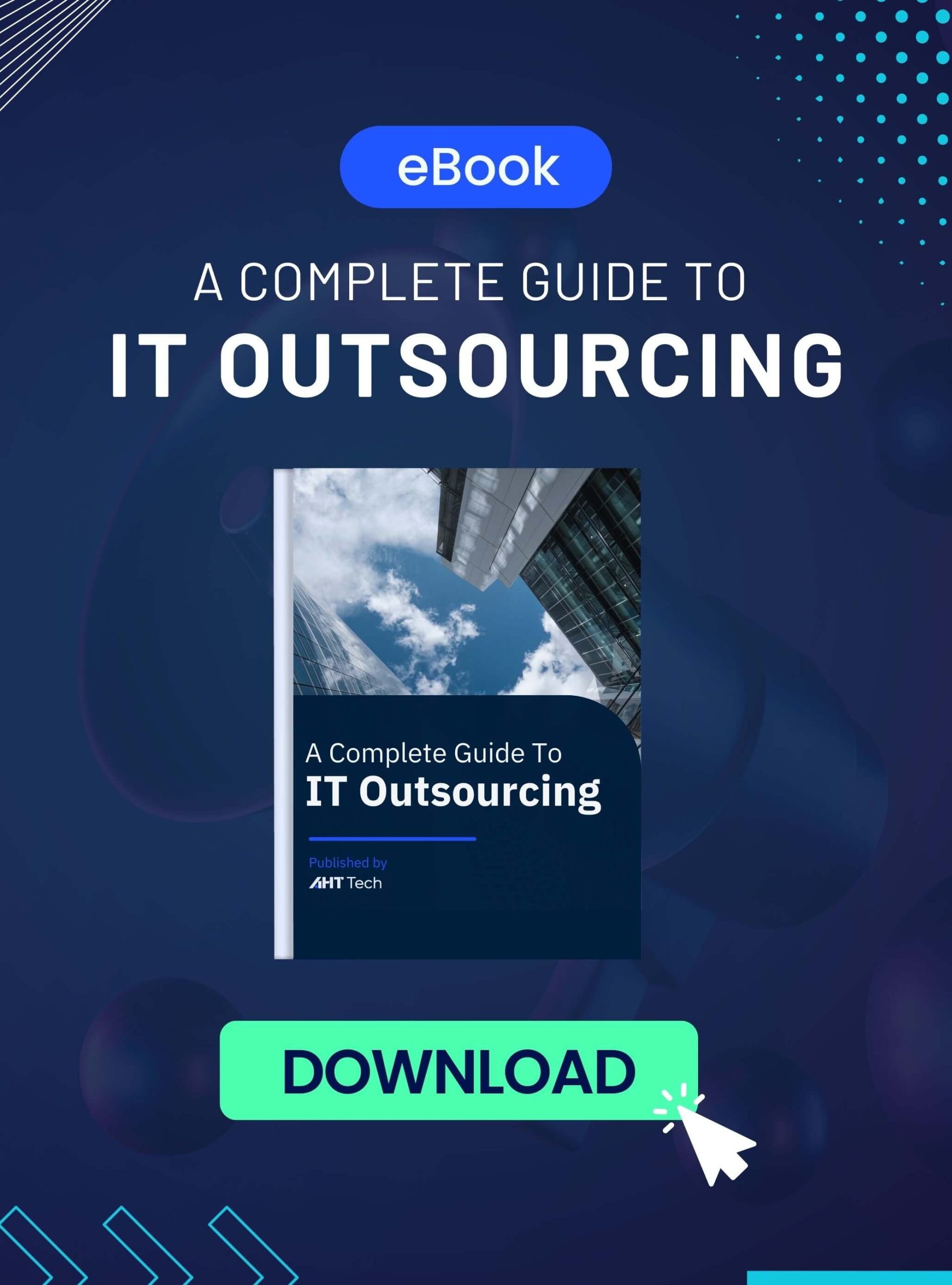TABLE OF CONTENT
Overview of BigCommerce and Shopify
Features and Functionality
Pricing and Cost
Design and Customization
Payment and Shipping Options
Conclusion
Overview of BigCommerce and Shopify
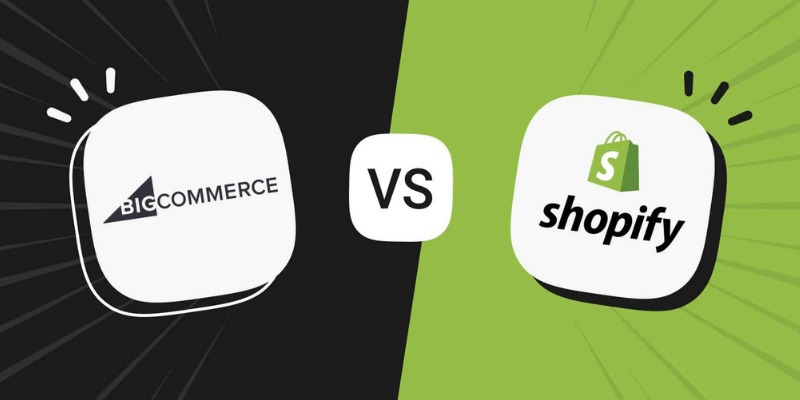
The two most popular commercial e-commerce platforms in Malaysia now are BigCommerce and Shopify. Both platforms allow enterprises to create and control online stores, and supply various functions to assist enterprises sell products online.
Including a powerful product management system, flexible transportation and tax tools, and a series of marketing, promotion, and advertising tools, BigCommerce is a rich platform, providing many excellent tools for your business.
In addition, Shopify has many third-party application options to extend its functions, are more modern and easier to use and install.
Ultimately, these two platforms are strong choices for e-commerce businesses (in all levels and sizes) who want to expand their online business, it all depends on the specific demands and requirements of the business to choose wisely, suitable between BigCommerce and Shopify.
Features and Functionality
When it comes to features and functionality, both BigCommerce and Shopify offer a range of powerful tools for eCommerce businesses.
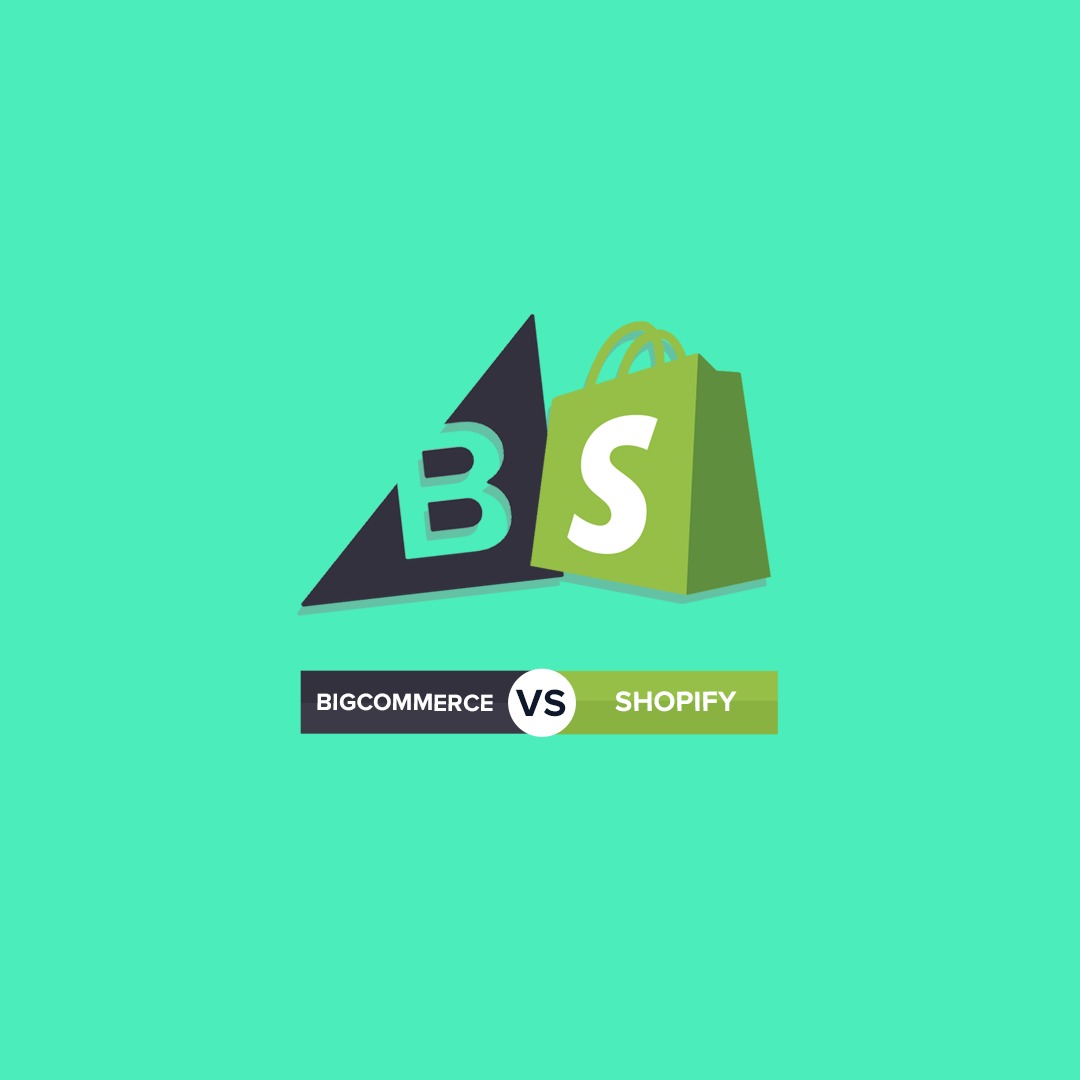
Product Management
BigCommerce supplies a powerful product administration system, which does it easy for enterprises to create stores, and arrange and edit their products. It provides a series of functions, including mass import and production, product variants, and product rules. Shopify also provides a product management system, but this system is more practical than BigCommerce.
It provides some advanced functions, such as product variants and product rules, but it lacks the ability of large-scale import and production of BigCommerce.
Payment Processing
Payment processing is critical for any eCommerce business, Both BigCommerce and Shopify provide sellers and buyers with various payment options (online and cash).
BigCommerce supports many different payment gateways, including PayPal, Stripe, and Square. With a wide range of payment entrances, consisting of PayPal and Stripe, and provides a payment gateway are things Shopify Payments offer; however, if you use a third-party payment gateway, the platform will charge extra.
Shipping and Fulfillment
The main component of any level from all the size e-commerce business is execution and delivery, and both BigCommerce and Shopify offer a large range of transportation and making selections for buyers and customers. BigC Commerce provides flexible taxation and transportation tools, allowing enterprises to calculate transportation costs according to weight, location, and other factors.
Businesses and sellers can show the right freight rates to customers during the payment process with different prices of various freight forwarders in real-time shown clearly on display, it also supplies a range of promotional tools, consisting of discounts, coupons, and gift cards. A range of marketing and promotional tools, but it relies more heavily on third-party apps to extend its functionality are the things Shopify also offers.
Marketing and Promotion
Both BigCommerce and Shopify provide a series of tools to help enterprises market and promote their products. BigCommerce provides a series of integrated marketing tools, including abandoned shopping cart recovery, customer segmentation, and email marketing, it also provides a range of promotional tools, including discounts, coupons, and gift cards. Shopify also supplies a range of marketing and promotional tools, but it depends on more heavily on third-party apps to extend its functionality.
Pricing and Cost
Two of the most important factors for Malaysian businesses when choosing an eCommerce platform are price and cost, both BigCommerce and Shopify supply a variety of pricing plans to match different business needs.
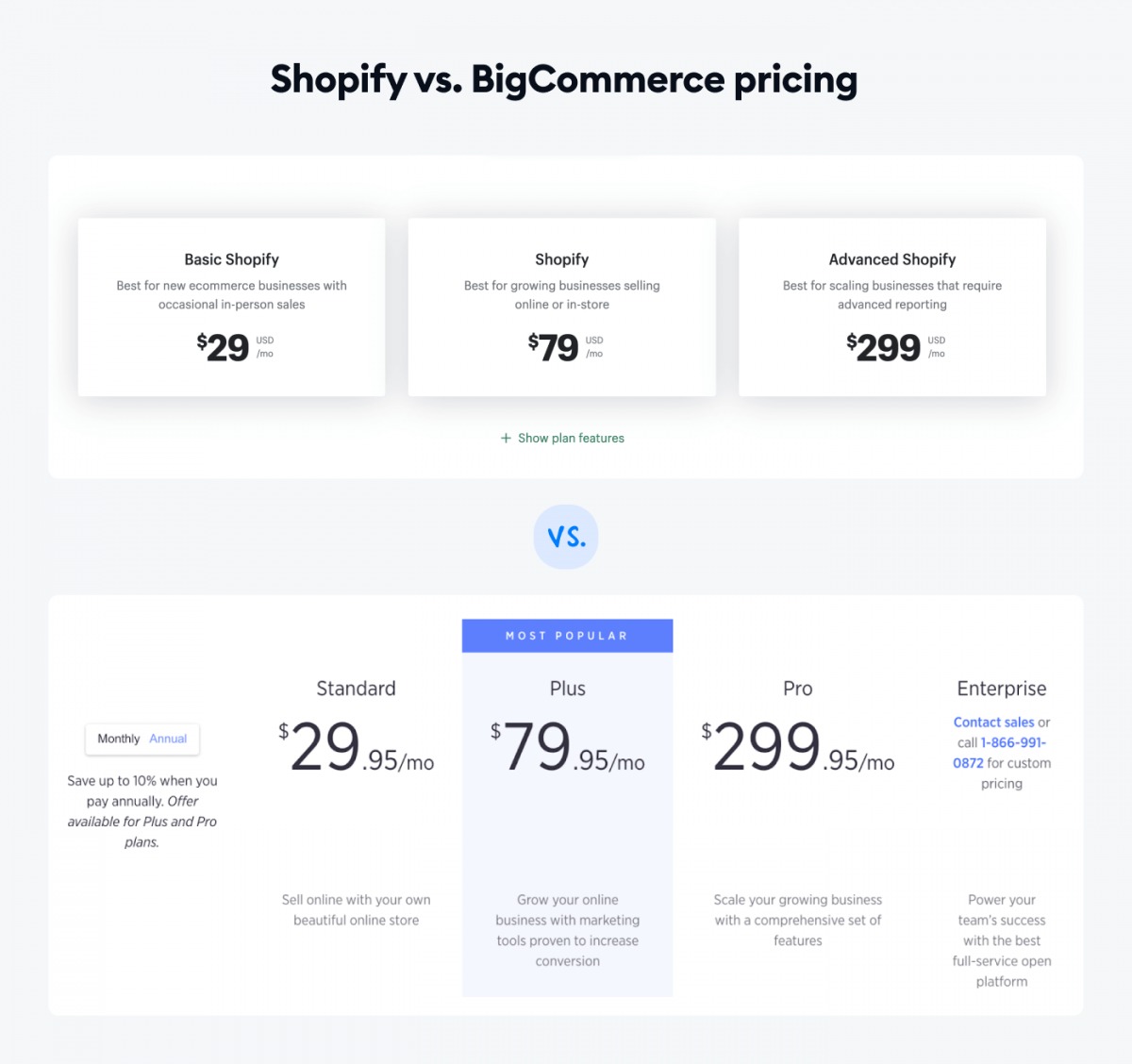
BigCommerce Pricing
Large commercial valuation BigCommerce offers a variety of pricing plans to suit different business needs. The BigCommerce pricing plans are categorized into three tiers: Standard, Plus, and Pro. The standard package starts at $29 and provides a series of functions, containing unlimited products, recall, bandwidth, a powerful product management system, and flexible tax and transportation calculators. The Plus plan starts at $79.95 per month and adds features like an abandoned cart saver, customer grouping, and product filtering. The Pro plan starts at $299.95 monthly and offers advanced features, including custom SSL, Google customer reviews, and faceted search.
Shopify Pricing
Basic Shopify, Advanced Shopify, and especially Advanced Shopify are three levels that Shopify divide. The Basic Shopify plan begins at $29 per month and provides features like unlimited products, storage, bandwidth, a website builder, product management, and delivery administration. Shopify plans start at $79 per month and add features like gift cards, pro reports, and abandoned cart recovery. The Advanced Shopify plan starts at $299 per month and offers advanced features, including third-party calculated shipping, advanced report generators, and custom reports.
Additional Costs
In addition to monthly subscription fees, BigCommerce and Shopify both charge transaction fees for each sale made through their platform. BigC Commerce charges 1.5% transaction fee for all packages, but if the enterprise uses one of BigCommerce’s payment partners, such as PayPal or Square, this fee can be exempted. Shopify transaction different fee pricing plans, from 2.0% for the common Shopify plan to 0.5% for the enhanced Shopify plan.
Design and Customization
In terms of design and customization, BigCommerce and Shopify both offer several choices.
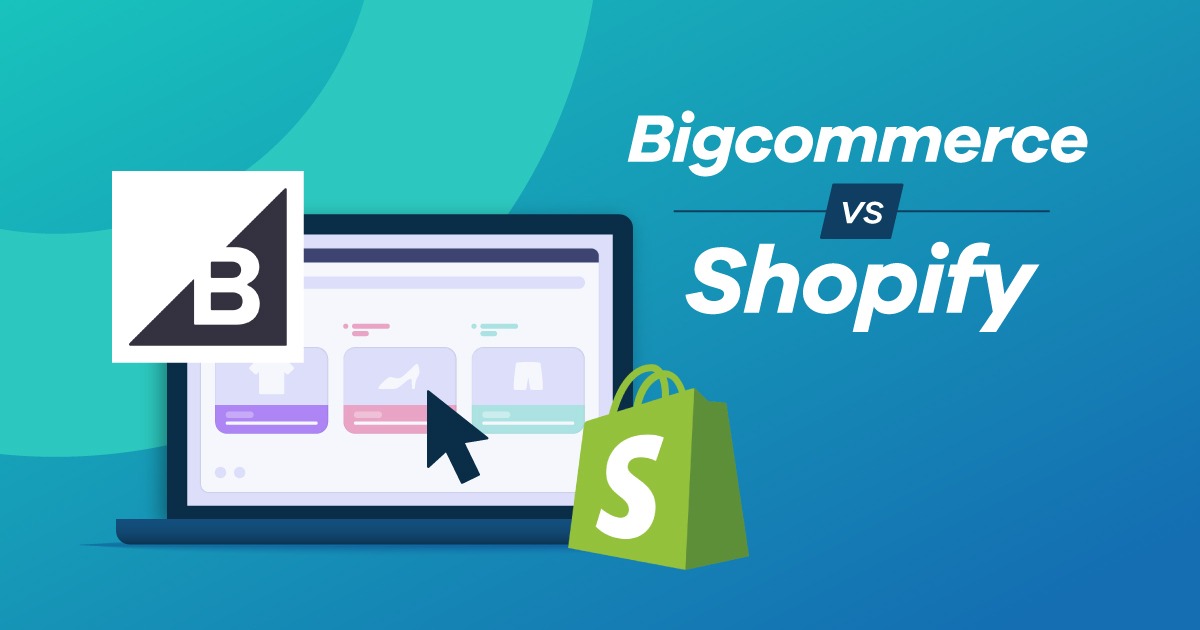
Customizable Themes and Templates
BigCommerce and Shopify both offer many customizable themes and templates that businesses and traders can use to generate online stores to sell their products.
BigCommerce supplies over 100 themes, each with a series of custom options, consisting of color schemes, fonts, and layouts. Shopify also provides many customizable topic choices, but it is worth noting that many themes.
Drag-and-Drop Page Builder
You enable add and arrange elements such as text, images, and product listings to generate unique designs using the page builder, making it easy to make custom pages for your own online store on BigCommerce with feature capabilities to create powerful drag-and-drop pages. Besides that, do not as enhance as BigCommerce, Shopify also has a drag-and-drop page, Shopify’s page builder is simple and intuitive making it easy for beginners to use despite having fewer customization options than BigCommerce.
Advanced Customization Options
If enterprises and sellers require more advanced customization options, BigCommerce will be a better choice. With a flexible, BigCommerce open architecture permitting businesses to customize their online store to meet their demands. Besides that, Shopify is a more closed system with fewer choices for advanced customization by businesses.
Third-Party Apps
Shopify has more application options than BigCommerce, but many of them are paid options. BigCommerce has fewer application options, but many popular applications are free, and many of the third-party apps for both platforms offer additional design and customization options.
Payment and Shipping Options
Payment and shipping options are critical for eCommerce businesses. Both BigCommerce and Shopify offer a range of payment and shipping options.
Payment Options
BigCommerce and Shopify both supply a range of expense choices, consisting of credit cards, PayPal, and other third-party payment entrances. To done transactions rapidly and effectively, BigCommerce also supplies a seamless payment process to customers and buyers. Shopify’s payment procedure is also basic and efficient, making it easier for buyers to have done transactions but it mainly relies on third-party applications to widen its functionality.
Shipping Options
Both BigCommerce and Shopify supply various delivery choices for sellers and buyers, including tax calculators and real-time shipping; BigCommerce’s delivery selections are much more enhanced than Shopify’s, it provides a variety of shipping integrations, containing UPS, DHL and FedEx.
BigCommerce offers more transportation and handling options, such as fixed rates, weight, and project-based transportation. Besides that, Shopify relies on third-party applications to get additional transportation functions. Shopify does gives a range of delivery options such as free shipping for all customers, carrier-calculated shipping, and local delivery.
Payment and Shipping Integration
Both BigCommerce and Shopify offer seamless integration between payment and delivery options.
BigCommerce integrates several payment entrances, permitting you to easily control and make transactions, and shipments from each platform.
Shopify also integrates with multiple payment gateways and shipping carriers, and Shopify’s app store offers a wide selection of third-party apps that offer additional integration options.
Security and Fraud Prevention
BigCommerce and Shopify pay special attention to fraud prevention and fraud prevention and they both provide advanced security functions, including SSL encryption and PCI compliance. In addition, BigCommerce supplies safe keeping features ( such as fraud detection and prevention tools) to assist businesses to resist today’s highly complex fraudulent transactions. Shopify also offers fraud prevention tools and provides chargeback protection for eligible transactions.
Read more
Conclusion
Malaysian businesses need to consider their specific needs, demand, and requirements to decide the right platform. BigCommerce may be the best choice for businesses and large enterprises that require more advanced features and functionality. For traders that are worth ease of use and a large option of third-party apps, Shopify will be the better choice. We are here to help businesses make the right choice and offer all BigCommerce services at our BigCommerce partners in Malaysia, please contact us to learn more today!



